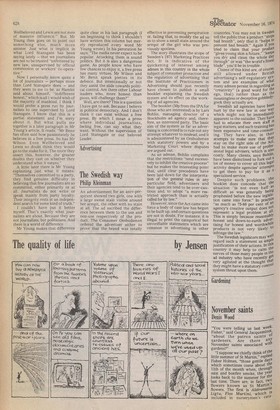Gardening
November saints
Denis Wood
"You were telling us last Weelr: Fisher," said General JacquemieeL; "about the patron saints 0' gardeners. Are there eal November saints associated WI"' gardens?" "I suppose we chiefly think oft he little summer of St Martin," replleci Fisher Holmes, "those gentle daYs which sometimes come about th,e 11th of the month when, througe mist and bonfire smoke, the Year looks back to the summer for the last time. There are, in fact, Mc° flowers known as St Martin.s flowers. The first is Alstromerip Ligtu, Flos Martini, which Is included in nurserymen's cata Stator November 16, 1974 logues. The plant has beautiful lily-like flowers of buff cream, pink, salmon and of flame — in June and It is also known as the reruvian lily, which suggests it was named after St Martin de Porres, a mulatto lay-brother in a Dominican FttarY at Lima in Peru. He died about 1639. He happens to be a 3rd. November saint, his day being the "The other plant bearing St Martin's name is Sauvegesia erect, known also as the Iron Shrub. I had to look this up in the RHS dictionary. It is, apparently, an annual stove plant only about six inches high with pink and red flowers. I suppose we ought to go to ,Kew one day to look at it; it comes 'font tropical America and it seems to me that it may also be named after St Martin de Porres. 'But the saint who gave us St Martin's summer must have been the great St Martin of Tours, whose 1)04 was interred in the Cathedral int that city on November 11, 397. Like Many of the early Christian taints, he was a great traveller and led an immensely varied life, He ‘A'as born at Sabaria in Pannonia Which we now know as Hungary in about 315, son of a soldier in the alltlY of the empire. His father was soon posted to Pavia where Martin have first found himself stirred Y Christianity. His biographer, Stilpicius Serverus, states that he it)edarne a catechumen at the age of
but soon after joined the army.
nen serving in Amiens he saw on a freezing winter day a beggar in rags shivering at the gate. Martin cot off a piece of his own cloak and gave it to the beggar. That same evening he had a dream in which ti ,he beggar was seen to be Christ. C Illediately after this Martin was f aPtised but did not leave the army Pr,some years after the Emperor than had had him put into prison tor stating that he wished to give up the array
and serve Christ. When he
s released he joined St Hilary at roitiers as a humble member of the clergy there. St Hilary was an active opponent of the Arian heresy was spreading at that time o he probably indued Martin Zitil some of his militant activities. h artin left Poitiers and returned oh, with the intention of conii"-Ing his parents to Christianity. hies succeeded with his mother but thellfather remained a pagan. He 411 began his travels again. In ArrIcum he actively opposed the an heresy and was publicly btl'it'rged. He moved on to Milan Ali was again driven away by the mil,an bishop, Auxentius. From for'll be went to Genoa and lived iSla a time in a hermitage on an th'All the rest of his life, in spite of u e activities which were forced 132311 him, he longed to live in h"teat. From this island he went ack to Poitiers where St Hilary he him a piece of land on which pe built the first monastery in Dill'atice, that at Liguge. Later beartin moved to Marmoutier 8ife,re being invited to become the wial'oP of Tours, a preferment l iCh he reluctantly accepted, and ed out his episcopal duties ti„""e chiefly resident at Marmou
buring this time he was again active in combating the Arian heresy and travelled extensively in France visiting Chartres, Paris, Autun and Vienne where he found St Paulinus of Nola and treated him for an affliction of his eyes."
"Ah, yes," said Ulrich, "St Paulinus of Nola, wasn't he the one who wrote some of the lovely Latin poems translated by Helen Waddell in her Mediaeval Latin Lyrics?"
"That's right," said Mrs Laing. "Well," Fisher went on, "Martin got involved again with heresy against a gnostic-Manichean brand of it known as Priscillianism although in the end he interceded for clemency which was not granted by the Emperor. "St Martin died an old man at Candes by the Loire on November 8 in the year 397."
"I went to church there on Palm Sunday once," said Ulrich, "there were sprigs of box for palm,"



































 Previous page
Previous page